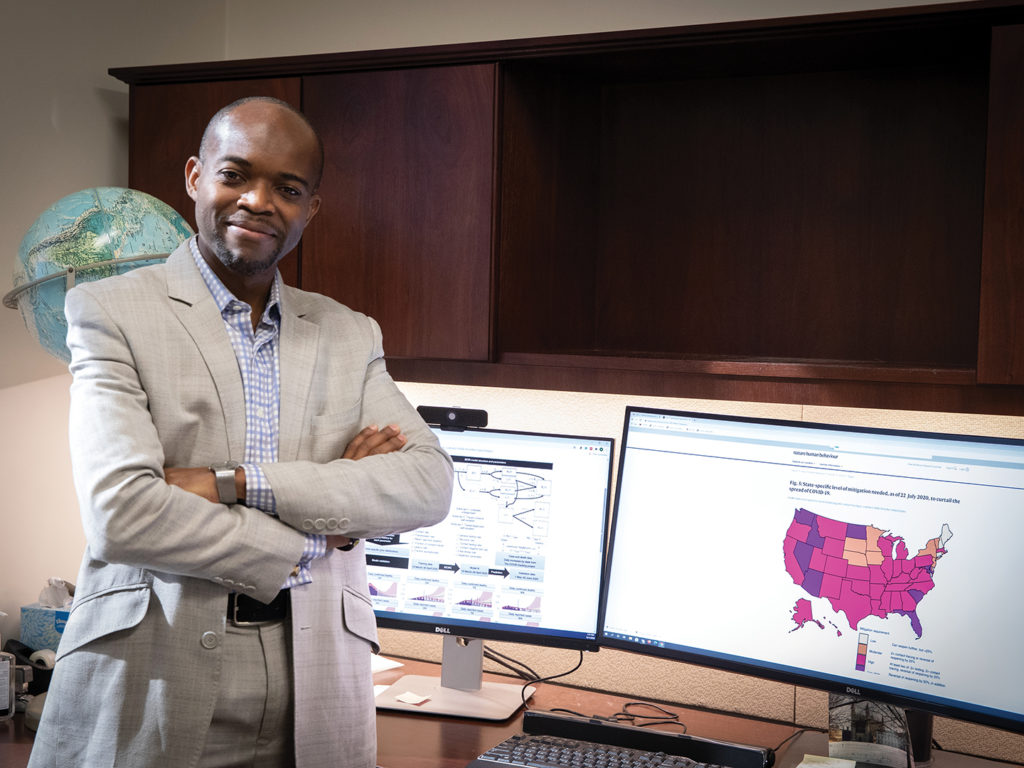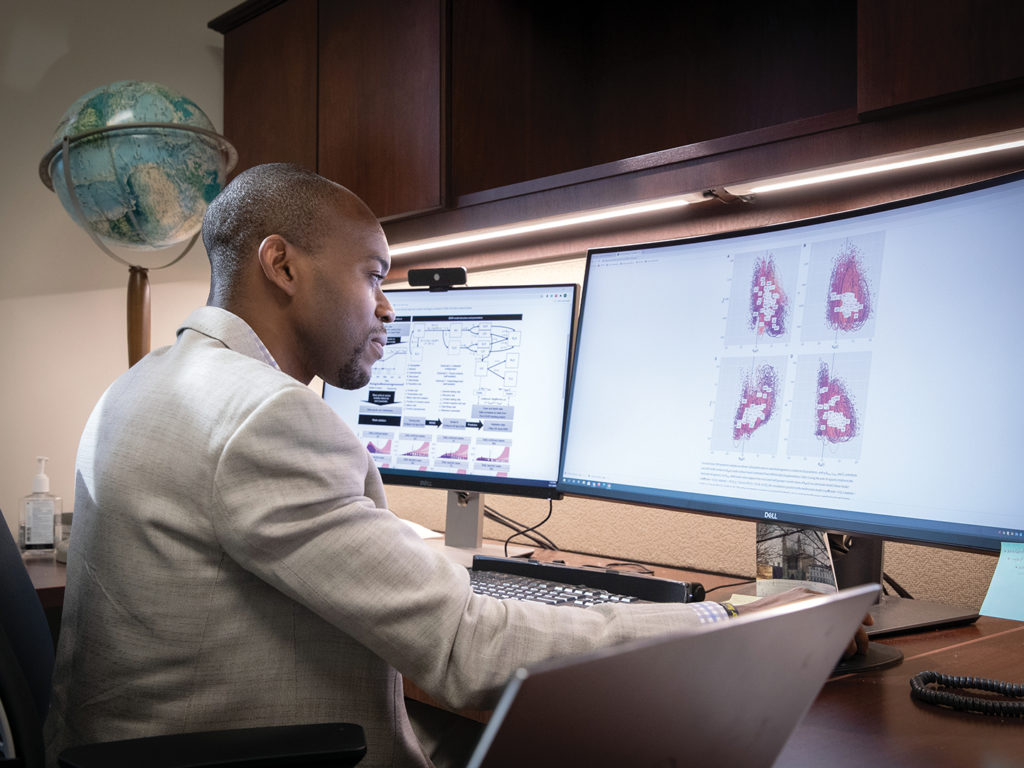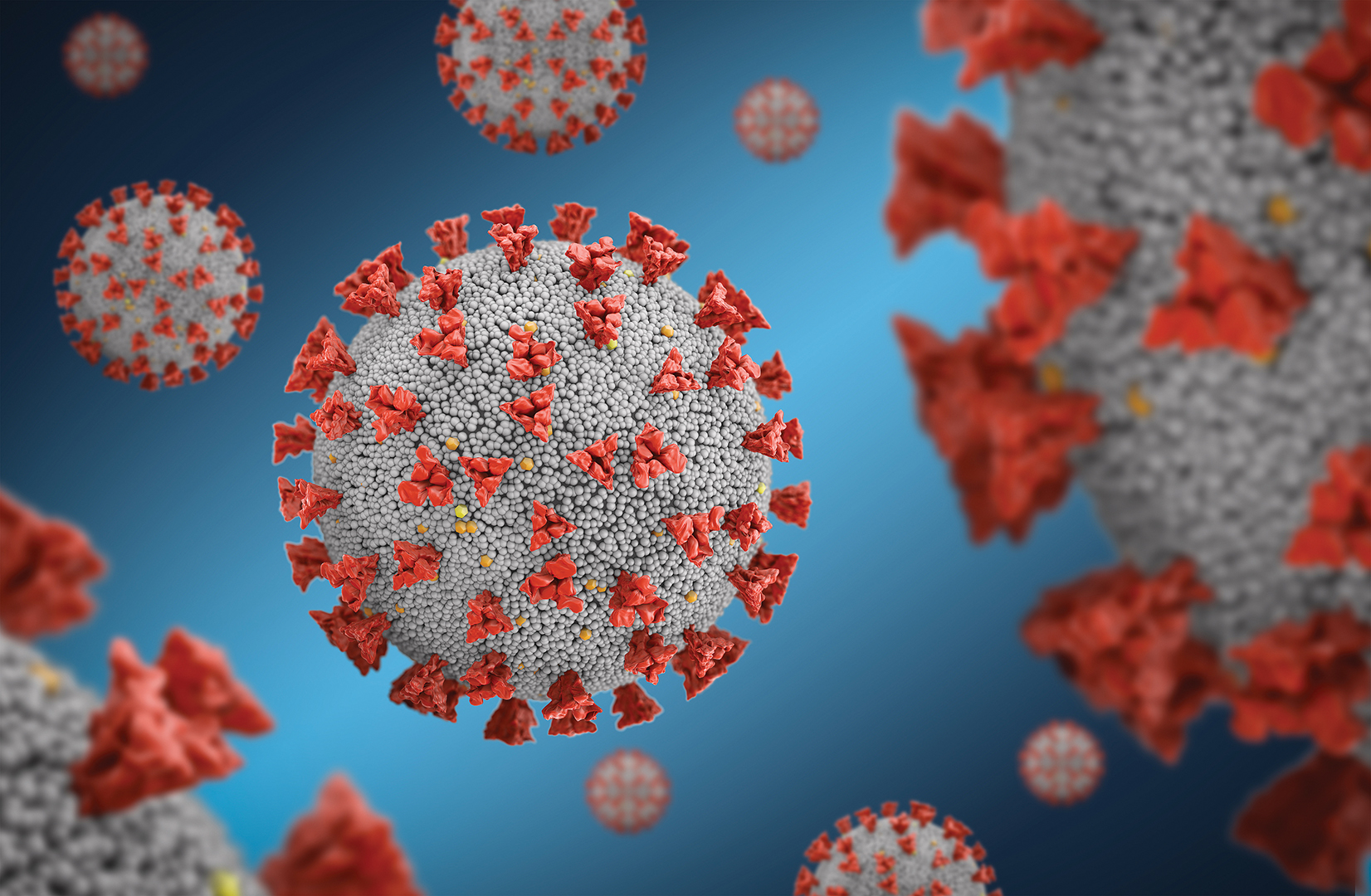CVMBS Researcher Uses Disease Modeling To Help Combat Global Infectious Outbreaks
Story by Margaret Preigh, CVMBS Communications

When an area is struck by disease, chaos can often consume the community as they try to organize in the midst of fear and confusion. Dr. Martial Ndeffo, an assistant professor in the Texas A&M College of Veterinary Medicine & Biomedical Sciences (CVMBS) Department of Veterinary Integrative Biosciences (VIBS), helps local officials make sense of these uncertain times by diving into the data that will help those officials identify the best responses to control or prevent disease outbreaks.
Ndeffo’s research uses transdisciplinary modelling approaches to identify and address challenges for a range of infectious diseases. Infectious disease modelling uses the mathematical analysis of data to develop quantitative representations of disease systems and their interacting variables, called a model. By developing data-driven models, Ndeffo helps characterize emerging diseases in uncertain situations, identify the best strategies for disease control and prevention, and analyze public health responses from a health and economic perspective to inform public policy.
This life-saving research has taken him around the world, from Ebola outbreaks in West and Central Africa, to studying Dengue, Chikungunya, and Zika outbreaks in the Americas, to domestic work addressing the HIV/AIDS epidemic and HPV in the United States.
“I have a sense of adapting to new situations,” Ndeffo said. “I think that also comes with training as a mathematician, always having a problem-solving type of mentality, which you apply to your daily living.”
A Life Of Numbers
Ndeffo knew he wanted to be a mathematician from an early age–his father and elder brother had degrees in mathematics and the interest was engrained in his family. Although mathematics was always a part of his life, Ndeffo initially was not drawn to the path of epidemiology.
“My motivation initially was really to focus more on financial mathematics, go into the stock market, and get a financial job in London,” he said. “But I had more interest in focusing on things that were close to home, meaning how could I really use my skills to address problems that affect my home country and continent. That’s why I started to look more into mathematical biology, especially mathematical epidemiology, looking into infectious diseases.
“I think a lot of people do math because of the challenge. For me, it was partially about liking the challenge and being willing to go at it, but it’s really the contribution, the impact you might have on people’s lives if you’re able to do decent work, if you’re able to communicate it and get engaged with clinicians, and public health practitioners.”
His education began in his home country of Cameroon, a largely Francophile country, but school took him to South Africa, an English-speaking nation, for his master’s degree in mathematics. Ndeffo says that his grasp on English at the time was difficult but that math was a universal language for him. He was able to learn both languages—English and math—simultaneously in South Africa.
Secure in both the language and his skill, Ndeffo earned a spot at the University of Cambridge for his second master’s degree in applied mathematics. He remained at Cambridge as the Gates Scholar, a prestigious scholarship funded by the Bill and Melinda Gates Foundation, as he completed his Ph.D. in mathematical biology.
Heading stateside, Ndeffo completed his postdoctoral work at Yale University, fully diving into the world of infectious disease modelling and becoming engrossed with both the work and the impact it can have.
“My motivation was really helping to address some of these problems practically,” he said. “As long as I see that there is a need, as long as I see that this might be helpful one way or another, I will try to make time to make my contribution, as small as that might be, to a specific situation.”
Stepping Into A Crisis

Modelling infectious diseases is a challenging endeavor–not only does it require the researcher to enter a chaotic and sometimes dangerous environment, but because emerging diseases are not yet entirely understood, it also requires the modeler to predict the future when the present isn’t entirely known.
Ndeffo explains this challenge as, “as uncertain as your inputs are so your output will be.”
The nature of this research requires investigators to be flexible and adapt to new situations, both in the collection of their data and in their physical environment. Ndeffo explains that when outbreaks happen in countries with fewer resources, the human element of this research can take on an important role.
“When the 2014 Ebola outbreak started in West Africa, especially in Liberia, I was part of a team at Yale University that started to think about how we could contribute to that crisis,” he said. “It was very much a dire situation; it was almost the worst disease in the world happening in the poorest countries in the world.”
A member of Ndeffo’s team had the idea of providing their Liberian field collaborators with laptops and mobile phones to be used for contact tracing efforts, after learning through the Liberian Ministry of Health that many members of their Ebola response teams had been collecting data using pen and paper and travelling long distances to deliver these data by hand to public health authorities for analysis.
“You have maybe a weeklong lag between when the data was collected and when public health authorities are able to look at them and make a decision. By the time the cases were identified, the situation was completely changed,” he said. “One thing that made a big difference was a very simple mobile phone application where you can observe something on the ground and just enter those observations. People in Monrovia, the capital, could access the data in real time, they could make a decision, and you could act in real time in the field.”
Ndeffo thinks this example illustrates the comprehensive view one must take in evaluating pandemic responses. Providing these devices was not directly connected to the team’s task of modelling, but this simple contribution had a considerable impact and saved lives.
Ndeffo says this is why it is important to bring local people into the conversation, take their concerns into account, and provide ownership of a situation when designing public health interventions.
“You really have the possibility of making an impact, and at the end of the day, that impact always saves lives,” Ndeffo said. “It’s really that end product of helping to reduce mortality and disease burden. That really drives me in doing what I do.”
Maximizing his positive impact on the world is central to Ndeffo’s career.
Recently, he has focused a lot of his energy on working on neglected tropical diseases. He says that because they are neglected, there is little existing research and he sees a window to make significant contributions where others may not think to look.
“Definitely there is an opportunity there, an opening to contribute and for your result to be directly considered by public health decisionmakers,” he said. “You can really bring a tangible impact to these situations, so that’s been the reason why I’ve put a bit more time into neglected tropical diseases.”
A Pandemic Comes Home
Recently, Ndeffo has diverted his research efforts into studying the development of the global COVID-19 pandemic. His work modelling COVID-19 is reminiscent of previous research he has done on emerging diseases, and his adaptive nature is a strength in navigating the challenges of studying a disease that is not yet fully characterized.
“Like any emerging disease, it is difficult to study because there are a lot of unknown factors,” he said. “Having the experience of working on Ebola in 2014, I’m a bit familiar with these types of developing situations, but there’s always a problem in that you will have a lot of things that you don’t know about the disease itself.”

Although the current situation presents many challenges, he is optimistic that this crisis will push our society to be more resilient in the face of infectious diseases; public interest in models of COVID-19 has driven more informed decisions on how we react to this pandemic.
“I think that whether we want to or not, we have to learn something. A lot of things will have to change,” he said. “For society really to come into that place, we need a more multi-disciplinary vision or analysis of what has happened and how to prepare for what might happen. It is very important for us not to do it in isolation but to really bring many disciplines together, because of the multifaceted approach of these situations.”
Although he is hopeful for the future, Ndeffo cautions that the effects of COVID-19 might be more far-reaching than we initially observe. The strain this virus has placed on our healthcare system can lead to overwhelmed health facilities, delayed care, decreased access, reduction in the utilization of essential services, and other effects for individuals who are suffering from non-COVID health conditions.
“When you think about these emerging diseases, we have to think about what I call the indirect impact. It becomes more and more clear that the indirect impact of COVID is very substantial and nobody knows—it might even be worse than the direct impact of COVID,” he said. “This brings us to that place where we design our intervention measures and our preparedness strategy; we really have to think beyond the direct impact of the disease. It has to be taken into account how we keep the right balance between addressing public health holistically rather than as a single problem that we are trying to solve.”
Ndeffo sees a need to continue studying COVID-19 as the pandemic develops and is eager to lend a hand where he can. He is also continuing his research with neglected tropical diseases, with the hope that his modelling will inform a strategy for elimination.
Disease outbreaks are scary and oftentimes confusing situations, as the global population has collectively experienced over the past year.
Luckily, epidemiological modelers like Ndeffo are able to assess data describing the present and provide insight into how we should best respond to uncertain situations to create a brighter future for us all.
###
Note: This story originally appeared in the Spring 2021 edition of CVMBS Today.
For more information about the Texas A&M College of Veterinary Medicine & Biomedical Sciences, please visit our website at vetmed.tamu.edu or join us on Facebook, Instagram, and Twitter.
Contact Information: Jennifer Gauntt, Director of CVMBS Communications, Texas A&M College of Veterinary Medicine & Biomedical Sciences; jgauntt@cvm.tamu.edu; 979-862-4216


